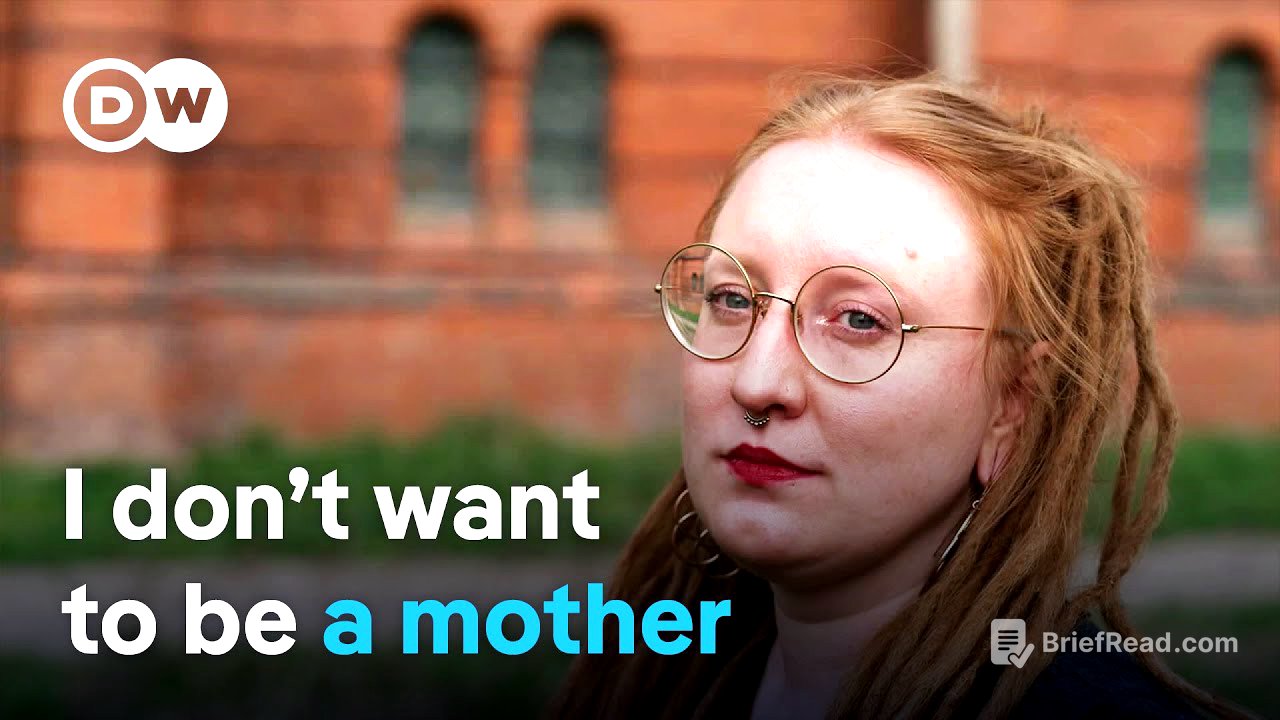TLDR;
This documentary explores the societal pressures and personal choices surrounding motherhood in Germany, contrasting the experiences of women who embrace motherhood with those who actively choose childlessness. It examines historical influences, such as Nazi ideology and the division of East and West Germany, on the perception of women's roles. The documentary also highlights the challenges women face when seeking sterilisation and the increasing number of young people opting out of parenthood due to various factors like climate change and personal freedom.
- Societal expectations and historical context influence women's choices about motherhood.
- Women who choose childlessness often face judgement and difficulty accessing sterilisation.
- Personal freedom and the state of the world are key factors in the decision not to have children.
Family Reunion and Diverging Paths [0:46]
Claudia enjoys a family reunion in the Laitz region, cherishing the time with her sister's children, including her godchild Camila. Despite having a partner, Claudia has never desired children of her own, a decision she has remained steadfast in since the age of 40. In contrast, Claudia's sister always envisioned having a family and could easily imagine having lots of children.
Societal Expectations and Personal Choices [3:10]
The documentary highlights the restrictive expectations society places on women regarding pregnancy and motherhood. Women are often questioned about when they will have children and face pressure, even from gynaecologists, to have children once they reach a certain age. Anuka, a 34-year-old IT specialist, shares her experience of facing laughter and rejection when trying to get her tubes tied, with some receptionists telling her to come back when she's older and has children.
Historical Roots of Motherhood Ideals [5:37]
The documentary explores the historical roots of the idea that women must become mothers, tracing it back to times when marriage was primarily about producing offspring for personal success and income. Childless women were often devalued and blamed for the inability to conceive, sometimes leading to divorce. These outdated patterns persisted even after World War II, with some men in West Germany struggling to accept their wives working.
Nazi Ideology and the Image of the Mother [8:29]
Anuka points out the influence of the religious image of the mother Mary and the Nazi's use of the mother figure on the perception of women in Germany. The Nazis idealised women as mothers, pushing them out of top professions and celebrating motherhood with awards. Mothers were seen as warriors who gave birth to the nation, reinforcing the idea that a woman's primary role was to bear children.
East vs. West Germany: Contrasting Roles for Women [10:23]
The documentary contrasts the roles of women in postwar Germany. In communist East Germany, women were encouraged to work to address labour shortages, with the state providing childcare infrastructure and extended maternity leave. In contrast, wives in West Germany needed their husband's permission to sign employment contracts until 1977. Despite these differences, women in both East and West Germany still faced the burden of balancing work and childcare.
Generational Perspectives on Motherhood [12:11]
Claudia's mother, Christina, expresses her initial shock and concern about Claudia's decision not to have children, wondering if she had done something wrong in raising her. However, Christina eventually accepts Claudia's choice, recognising that everyone is responsible for themselves. Paul, Anuka's partner, supports her decision not to have children, citing concerns about the current state of the world and the future for children.
Changing Attitudes Among Young People [14:16]
The documentary notes that many young people now share similar concerns about bringing children into the world due to war, the climate crisis, and general uncertainty. Studies show an increasing number of young people are deciding not to have children. A 2023 survey in Leipzig confirmed that fewer young people see having children as a life goal compared to 2010.
Motivations for Choosing Childlessness [15:16]
Social scientists Claudia Ronfeld and Anat Hosko conducted a study asking over 1,000 deliberately childless women about their reasons for this decision. The most frequently mentioned motives were having more free time, greater opportunities to achieve their full potential, and freedom from the responsibility of caring for another person. Their findings challenge the assumption that career ambitions are the primary reason for remaining childless.
Backlash and Taboos [16:07]
The researchers were surprised by the variety of reactions to their work, receiving both encouragement and negative, demeaning comments. Some comments blamed women who choose not to have children for the decline of the German population and questioned who would pay for their pensions. These reactions highlight the taboo nature of the subject and the societal pressure on women to have children.
Obstacles to Sterilisation and the Fight for Bodily Autonomy [17:54]
Anuka shares her struggles to find a doctor who would perform a tubal ligation, facing rejection and judgement from gynaecologists. Meanwhile, her partner Paul found it easy to schedule a vasectomy. An internet map compiled by two women in Leipzig helps women find doctors in Germany who will perform the procedure. Susanna and her group, Selishimil, advocate for women's right to self-determination and access to sterilisation.
Historical Perspectives on Birth Control [20:10]
The documentary references Dr. Ulius Moses, who advocated for birth control and women's bodily autonomy over a century ago. He called for a birth strike to demand improved maternal and infant protections. Despite these historical efforts, there is still significant resistance to women opting out of motherhood, with Susanna collecting some of the worst statements made against women who choose sterilisation.
Anuka's Journey to Sterilisation and Lasting Happiness [22:58]
After years of searching, Anuka finally finds a doctor in Halle who will tie her tubes. Even then, she faces questioning and criticism, including on the day of the operation. Despite these challenges, Anuka experiences immense relief and happiness after the procedure, feeling that she has finally secured her bodily autonomy. She has not regretted her decision and is just as happy now as she was six years ago. The Gara University study supports this, showing that 95% of women surveyed had no regrets about their decision.









